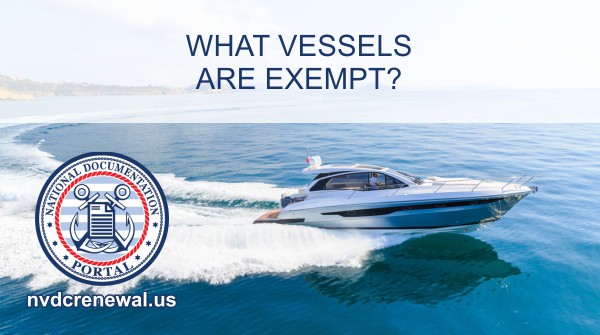Some vessels are exempt from national vessel documentation, meaning they are not required to be documented with the United States Coast Guard. Typically, these vessels do not meet the size requirements or are used in ways that don’t require documentation obligations. For example, vessels that measure less than five net tons and are used exclusively for recreational purposes are generally exempt.

National Documentation Portal
Additionally, many smaller, state-registered boats fall into this category. If you’re unsure whether your vessel is exempt, our team can help you find out before you begin the documentation process.
Vessel Documentation vs. Exemption
Not all boats need to be documented at the federal level. National vessel documentation is a federal registration system administered by the U.S. Coast Guard. It provides benefits such as proof of ownership, ease of transfer, and the ability to operate in international waters. However, not every vessel qualifies—or is required—to be part of this system.
A vessel must be at least five net tons and owned by a U.S. citizen to qualify. Those used for commercial purposes are typically required to be documented. But some recreational vessels may choose to document even if they are not required to, depending on how they’re used.
If your vessel doesn’t meet the minimum size threshold, or you only operate it in state waters for personal recreation, you may be exempt. That doesn’t mean your vessel is unregistered—it simply means you would register it at the state level instead of applying for national vessel documentation.
Common Categories of Exempt Vessels
There are several groups of vessels commonly exempt from the national documentation process:
- Recreational vessels under five net tons: Most boats smaller than 25 feet in length typically fall under this category.
- Boats not engaged in commercial activity: If your vessel isn’t used to transport goods or passengers for hire, documentation may not be mandatory.
- State-registered vessels used only within one state’s waters: These do not need national vessel documentation unless they’re engaged in coastwise or international operations.
- Non-self-propelled vessels not used for commerce: Barges and similar vessels may qualify for exemption depending on their operation and configuration.
If your vessel fits into one of these groups, you likely aren’t required to go through federal documentation. But because exceptions and overlaps do exist, especially for specialized uses, it’s best to verify your status.

What Is the Five Net Ton Rule?
A major determinant of whether national vessel documentation is required is the five net ton measurement. One net ton equals 100 cubic feet of internal volume, not weight. Most vessels at or above 25 feet meet this standard, though the actual calculation can vary based on design.
The five net ton rule is critical because any vessel smaller than that is automatically exempt. However, some owners of recreational vessels that meet the size requirement still opt for documentation due to the benefits it provides, such as financing eligibility and simplified ownership transfers.
To learn more about the five net ton requirement and how it applies to your vessel, you can refer to Title 46, Part 67 of the Code of Federal Regulations, which outlines the Coast Guard’s documentation standards. Our team is also here to help you determine your vessel’s tonnage and whether it qualifies for documentation.
Benefits of National Vessel Documentation (Even If Exempt)
Even if your vessel is exempt from national documentation, you might still choose to document it voluntarily if it qualifies. There are several advantages to having your vessel documented:
- National proof of ownership: Unlike state registration, documentation is recognized federally and internationally.
- No state hull numbers: Documented vessels do not require visible state registration numbers, which some owners prefer for aesthetic reasons.
- Eligibility for certain financing options: Some lenders require vessel documentation for loan approval.
- Ease of transfer and sale: Documented vessels can be transferred more easily between parties, especially when sold out of state or internationally.
- Legal presence in international waters: Documentation is often required for U.S.-flagged vessels in foreign ports.
We help recreational and commercial vessel owners file for documentation even when it isn’t mandatory. If your vessel is exempt but meets the eligibility criteria, and you’d like to explore the benefits of documentation, we can help you start with the Initial form.
Commercial Use and Documentation Requirements
If your vessel is used for commercial purposes and meets the five net ton minimum, you are likely required to have national vessel documentation. This applies whether you’re using the vessel for fishing, charter operations, freight, or other types of marine commerce.
Some commercial vessels may initially seem exempt due to their size, but specialized use cases may still make documentation mandatory. Failing to document a vessel when it’s legally required can lead to compliance issues, fines, or even impoundment.
We work with vessel owners to ensure their operations remain within the law. We also help with renewals, reinstatements, and endorsements necessary for commercial activities, such as coastwise trade or fisheries.
State and. Federal Registration
Just because your vessel is exempt from national vessel documentation doesn’t mean it doesn’t need to be registered at all. Every U.S. state has its own rules for registering recreational and smaller commercial vessels. These vary from state to state but generally include:
- Displaying registration numbers on both sides of the bow
- Maintaining up-to-date titles and ownership records
- Paying annual registration fees
- Adhering to state-specific boating regulations
When you register your vessel through the state, you’re receiving local permission to operate in those waters—not federal recognition. For some vessel owners, this is sufficient. For others, especially those involved in cross-border operations, documentation offers more comprehensive protection and convenience.
We don’t handle state registration, but if you’re unsure which system is right for you, we can offer guidance based on your vessel’s size and purpose.
How We Help You Navigate Exemption Questions
Understanding whether your vessel is exempt from national documentation can be confusing. That’s where we come in. We provide:
- Clear guidance on whether your vessel qualifies for exemption
- Help determining your vessel’s tonnage and usage classification
- Access to the correct forms if documentation is required
- Step-by-step assistance with submitting not just the initial form but renewal forms and others.
- Support throughout the renewal and endorsement process
Our streamlined system makes it easier to stay compliant. You don’t have to navigate federal regulations or guess at legal interpretations. We keep your documentation current, accurate, and secure—ensuring your time on the water isn’t interrupted by paperwork issues.
Filing Through Our Secure Portal
If you’ve determined your vessel does need documentation—or if you’d like to document voluntarily—you can file the paperwork directly through our site. Our secure online system simplifies every step and avoids common mistakes that can delay processing. We can even help with certified copies, reinstatement, and more.
From the moment you submit the form, we’ll review your application and let you know if any additional documentation is needed. We stay in contact so your vessel’s status is never left in limbo.
Whether you’re confirming an exemption or preparing to document, we make the process fast and accessible from anywhere. Let us help you find out what’s required, and make sure your vessel is in the right category moving forward.

